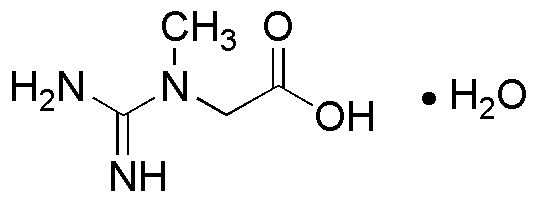Creatine hydrate is widely utilized in research focused on:
- Sports Nutrition: Commonly used as a dietary supplement to enhance athletic performance and muscle mass. It helps in quick energy production during high-intensity workouts.
- Neurological Research: Investigated for its potential neuroprotective effects, particularly in conditions like Alzheimer's and Parkinson's disease, where it may help improve cognitive function.
- Cell Biology: Employed in cell culture studies to support cellular energy metabolism, allowing researchers to better understand cellular processes and responses to various treatments.
- Pharmaceutical Development: Used in formulations aimed at improving muscle recovery and reducing fatigue, making it valuable in developing new therapies for muscle-related conditions.
- Metabolic Studies: Analyzed in research examining energy metabolism and muscle physiology, providing insights into metabolic disorders and potential interventions.
General Information
Properties
Safety and Regulations
Applications
Creatine hydrate is widely utilized in research focused on:
- Sports Nutrition: Commonly used as a dietary supplement to enhance athletic performance and muscle mass. It helps in quick energy production during high-intensity workouts.
- Neurological Research: Investigated for its potential neuroprotective effects, particularly in conditions like Alzheimer's and Parkinson's disease, where it may help improve cognitive function.
- Cell Biology: Employed in cell culture studies to support cellular energy metabolism, allowing researchers to better understand cellular processes and responses to various treatments.
- Pharmaceutical Development: Used in formulations aimed at improving muscle recovery and reducing fatigue, making it valuable in developing new therapies for muscle-related conditions.
- Metabolic Studies: Analyzed in research examining energy metabolism and muscle physiology, providing insights into metabolic disorders and potential interventions.
Documents
Safety Data Sheets (SDS)
The SDS provides comprehensive safety information on handling, storage, and disposal of the product.
Product Specification (PS)
The PS provides a comprehensive breakdown of the product’s properties, including chemical composition, physical state, purity, and storage requirements. It also details acceptable quality ranges and the product's intended applications.
Certificates of Analysis (COA)
Search for Certificates of Analysis (COA) by entering the products Lot Number. Lot and Batch Numbers can be found on a product’s label following the words ‘Lot’ or ‘Batch’.
*Catalog Number
*Lot Number
Certificates Of Origin (COO)
This COO confirms the country where the product was manufactured, and also details the materials and components used in it and whether it is derived from natural, synthetic, or other specific sources. This certificate may be required for customs, trade, and regulatory compliance.
*Catalog Number
*Lot Number
Safety Data Sheets (SDS)
The SDS provides comprehensive safety information on handling, storage, and disposal of the product.
DownloadProduct Specification (PS)
The PS provides a comprehensive breakdown of the product’s properties, including chemical composition, physical state, purity, and storage requirements. It also details acceptable quality ranges and the product's intended applications.
DownloadCertificates of Analysis (COA)
Search for Certificates of Analysis (COA) by entering the products Lot Number. Lot and Batch Numbers can be found on a product’s label following the words ‘Lot’ or ‘Batch’.
*Catalog Number
*Lot Number
Certificates Of Origin (COO)
This COO confirms the country where the product was manufactured, and also details the materials and components used in it and whether it is derived from natural, synthetic, or other specific sources. This certificate may be required for customs, trade, and regulatory compliance.

